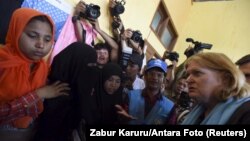Myanmar’s government said authorities are escorting a boat carrying more than 700 migrants to what it calls a "safe" location where their identities can be determined.
The office of Myanmar's president said the hundreds of migrants aboard the boat, who were abandoned by their smugglers, have been given food and water and have expressed a preference to go to Bangladesh.
The boat, spotted adrift last Friday, has been taking on water.
The migrants are believed to be primarily Rohingya from Myanmar's Rakhine state and were likely attempting to get to Malaysia.
Speaking at a news conference in Bangkok Tuesday, Arakan Project Director Chris Lewa said it appears that with smugglers' transit camps now exposed by authorities and shut down along the Thai-Malay border, arrangements are being made for more people to land near the origin of their risky trips.
'Still boat people at sea'
“My small, little team, which is based in Bangladesh, has heard that some brokers are still collecting money for disembarking in Myanmar or Bangladesh. So that means there are still boat people at sea. We believe the boats are in the Bay of Bengal. We're not sure," Lewa said.
A tally from her grassroots nongovernmental organization monitoring the situation showed at least 5,600 Rohingya and Bangladeshis coming ashore in five countries last month.
That leaves as many as several thousand people believed to have left Myanmar and Bangladesh still unaccounted for.
The internally displaced Rohingya, a Muslim ethnic minority in predominately Buddhist Myanmar, have received scant international attention.
That has been changing in recent weeks since mass graves of migrants were discovered in Thailand and Malaysia and warnings by aid agencies that those stranded at sea with little food and water were in peril with no country eager to accept them.
A camp in Sittwe, Myanmar, where tens of thousands of Rohingya reside, received a visit over the weekend from the American actor Matt Dillon.
In response to a VOA question at the briefing in Bangkok for correspondents, Dillon characterized the plight of the Rohingya as a “sad and heartbreaking” man-made problem that is solvable.
“The people aren't living in camps because of some disaster, natural disaster. This is a humanitarian situation that is caused by human beings' intolerance, fear, an unwillingness to allow people to co-exist," Dillon said.
The actor said he decided to go to the camp after hearing a desperate appeal a month ago from a Rohingya activist.
Dillon said, “Ultimately, they can't be stateless.”
Pressure from ASEAN
Last Friday in Bangkok, an urgent multinational meeting hosted by the Thailand military government made no breakthroughs in resolving the crisis.
But more discussions among ASEAN countries are set to be held, including addressing the root cause for the migration.
Liliane Fan, a research fellow with the Humanitarian Policy Group, said Myanmar is under rare pressure from Malaysia and other members of ASEAN, usually reluctant to tell other states in the region what to do.
“ASEAN, being such a consensus-oriented mechanism, it's quite difficult. But at the same time there are more and more questions now even coming up from very senior, influential figures in the region — former heads of state and former foreign ministers — who are saying this principle of non-interference is untenable in the face of mass human rights abuses," Fan said.
U.S. President Barack Obama on Monday called on Myanmar — also known as Burma — to stop discriminating against the stateless Rohingya. The president said this is crucial for the successful transition to democracy in Myanmar.
Obama commended Indonesia and Malaysia for giving temporary refuge to thousands of those displaced and he said the United States will also take some of the Rohingya.
Between a third and half of those on the boats with the Rohingya, are destitute Bangladeshis, seeking better opportunities in Malaysia and elsewhere.








